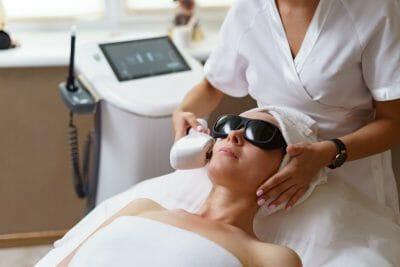Laser hair removal is becoming popular for removing unwanted hair in any part of the body. It’s a medical procedure that uses a laser beam to remove hair and inhibit the further growth of hair in that area. This procedure is entirely safe and effective. Common treatment locations are the armpits, chin, upper lip, hands, legs, and the bikini line. Nevertheless, people can remove laser hair on any area except the region surrounding the eyelids.
Laser hair removal is a popular cosmetic treatment nowadays, with many people considering it a viable alternative to traditional hair removal methods. In this article, we’ll explore this treatment procedure in detail, how to prepare your skin before treatment, and what to expect during the procedure.
The Basics of Laser Hair Removal
Laser treatment affects the hair follicles in a way that further hinders hair growth. Laser beams are drawn to color, specifically the pigment present in hair. When the hair pigment absorbs the laser light, it travels down to the hair follicle and disrupts or disables its ability to grow hair in the future. This process effectively inhibits hair growth through the targeted destruction of hair follicles.
Hairs grow in three stages: growth, resting, and shedding. Every hair’s growth rate and cycle are different; each grows at its own pace. Note that laser hair removal is effective on hairs in the growth phase. People should take three or eight sessions to ensure no hair follicle remains untreated.
Laser hair removal experience depends on hair thickness, skin color, gender, hormone levels, age, ethnicity, and many more factors. Earlier, this treatment was exclusively available to people who had light skin tones and dark hair so that the laser beam was attracted to the hair follicles. Though everyone can avail of this treatment today, regardless of their skin tones, people with lighter skin tones and dark black hair still get the best results. Nevertheless, significant technological advancement now enables people to enjoy this procedure safely.
Preparing for Laser Hair Removal
Before you proceed to sit for your first session, there are a few important key points that you must remember to prepare your skin for the treatment. Irrespective of your chosen laser hair removal service provider, you must follow these tips for better results. Mentioned below are some of them:
- Make sure your skin is clean and clear. It allows the laser beam to strike the hair follicle directly.
- Do not expose your skin for six weeks before your first sitting. Make sure you apply sunscreen every time you step out.
- Some people tend to have more sensitive skin than others. For them, using a numbing cream is advised. However, before you buy one, consult your doctor for the best numbing cream that would suit your skin. Apply it about an hour prior to your sitting.
- While undergoing the treatment, never pluck or wax your skin. People can, however, use a razor.
- Refrain from getting tanned. A lot of times, people sit for treatment with tanned or burnt skin. In such cases, the duration of treatment is prolonged. In fact, laser beams on tanned skin increase the chances of hyperpigmentation and burning.
- If you use retinol or tretinoin creams regularly, stop using them on your skin at least 3 -4 days before treatment.
- Refrain from drinking alcohol as it makes your skin dry.
- One should also refrain from drinking coffee.
After Laser Hair Removal
Perhaps, one of the reasons laser treatment is becoming so popular nowadays is the lack of downtime. Post-treatment, there is some redness and a mild burning sensation. These symptoms vanish within a few hours. However, make sure not to expose the treated skin to sunlight for at least six weeks after the treatment. Not just that, bathing in hot water should also be strictly avoided.
After the first sitting, most people witness a 10 to 25% reduction in hair growth. With subsequent sessions, hair growth stops eventually, with little or no hair growth in the future. Even if some hair grows, it is finer in quality, and a follow-up treatment every year is enough to remove them.
Conclusion
With so many laser treatment clinics available nowadays, it has become more important to do our research on them and find out the best. While choosing, make sure the service provider is qualified and experienced enough to conduct the treatment safely. Go through the reviews and testimonials of past patients and see their responses. By choosing a reputable and skilled laser treatment provider, you can ensure that you receive the best possible results with minimal risk or complications.
